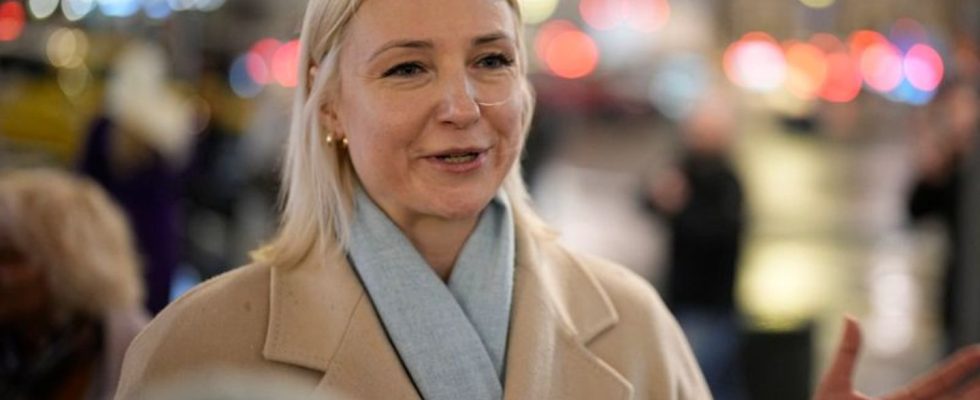Yekaterina Duntsova
Russia election: Putin opponent refused to register
Yekaterina Duntsova was denied registration for the presidential election on March 17. photo
© Alexander Zemlianichenko/AP/dpa
The re-election of Kremlin leader Putin is considered certain, which is also acknowledged by other parties that do not appoint any or only dummy candidates. An interested party critical of the Kremlin has now been coldly dismissed.
Russia’s election commission has blocked Kremlin-critical journalist Yekaterina Duntsova from registering her initiative group for the presidential election on March 17. The Commission said there were several errors in the organization of the initiative group and in the documents submitted.
Duntsova announced that she would appeal this “unlawful decision” to the Supreme Court. She also appealed to the liberal opposition party Yabloko to nominate her as a candidate. The party said Duntsova was unknown.
The 40-year-old Duntsova had previously criticized Kremlin leader Vladimir Putin’s policies and war against Ukraine and offered herself as an alternative to voters. She said she was committed to a “peaceful and democratic future for Russia.” The initiative group would have needed her to obtain signatures of support for registration as a candidate for president. There is no time left for that now, said Dunzowa.
Individual letter transposers were interpreted as “serious errors”.
A formation by a party like Yabloko could help her. “We cannot remain idle!” She has many supporters, said Dunzowa, who has almost 300,000 subscribers on the Telegram platform. According to Dunzowa’s supporters, individual letter transpositions in names were interpreted as “serious errors” in the documents.
The head of the Central Election Commission, Ella Pamfilova, is considered a close confidant of Putin. She said: “You are a young woman. You still have everything ahead of you. Every minus can be turned into a plus. Every experience is an experience.” Russian state media had previously linked the journalist to Putin’s opponent Mikhail Khodorkovsky, who lives in exile and finances opposition projects in Russia.
Moscow’s Nobel Peace Prize winner Dmitri Muratov viewed the election commission’s decision as a sign of fear. The Kremlin fears that something might not go according to plan. “How much the power apparatus no longer has to be convinced of itself if it doesn’t allow someone like Duntsova,” said the long-time editor-in-chief of the Kremlin-critical newspaper Novaya Gazeta, which is published in Russia. Duntsova is politically unknown in Russia.
Campaign “Russia without Putin”
Supporters of the imprisoned Kremlin opponent Alexei Navalny, who has been missing for more than two weeks, launched the “Russia without Putin” campaign before the election. They call on people to vote for any other candidate – just not Putin.
Putin’s opponents repeatedly complain that the election commission refuses to register candidates, citing formal errors. It is expected that candidates who do not represent serious competition for the incumbent will only be admitted to the upcoming presidential election.
The communists represented in parliament – in the State Duma – nominated 75-year-old Nikolai Kharitonov as their candidate and not the much better-known party leader Gennady Zyuganov. The Duma party Fair Russia decided not to have its own candidate this time and announced that it would support Putin. The nationalist Duma party LDPR is sending its chairman Leonid Slutsky into the race as a candidate, but he himself supports Putin.
Electoral Commission chief Pamfilova said the number of people interested in running for president was 29 on Saturday. It is certain that Putin will emerge victorious in his fifth presidential election. The head of the Kremlin had the constitution changed specifically in order to be able to run again. According to the currently valid version of the constitution, the 71-year-old can run for the last time in 2030. The presidential term in Russia is six years.

